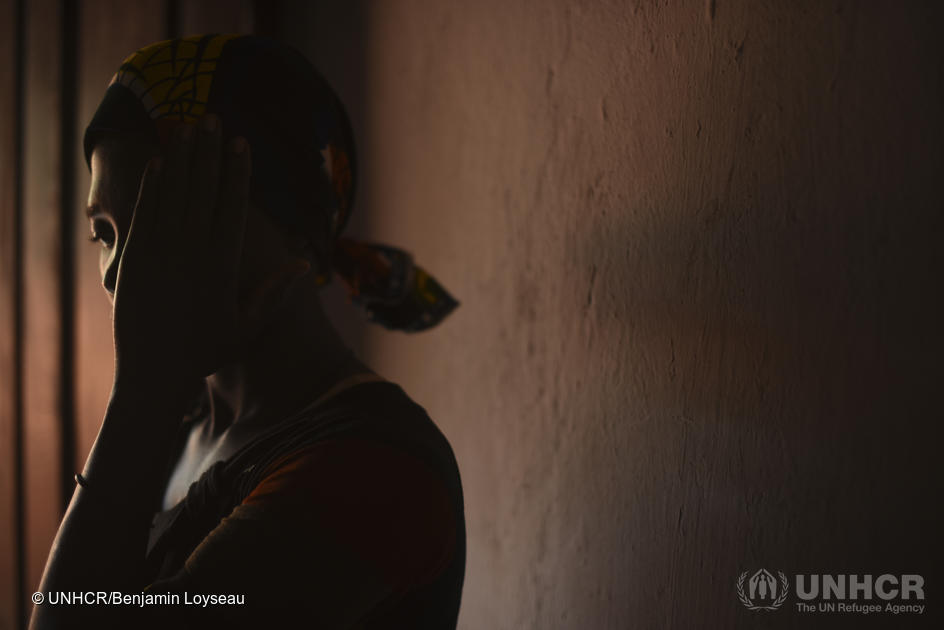Sexual and gender-based violence is a violation of human rights. It is largely rooted in individual attitudes that condone violence within the family, the community, and the State. Women and children, who are often most vulnerable to human rights abuses, are also the ones who suffer most from sexual and gender-based violence.
Refugees, asylum-seekers, stateless persons, and internally displaced persons suffer disproportionately from SGBV not only as a form of persecution and at the outbreak of a conflict but also during flight and displacement. UNHCR, together with States, thus shares the responsibility for ensuring that these persons of its concern are protected against sexual and gender-based violence. Effective protection can be established only by preventing SGBV before it occurs, identifying risks, and responding to the needs of survivors using a coordinated, multi-sectoral approach.
UNHCR promotes an inclusive, rights-based, and non-discriminatory approach to the provision of multi-sectoral response services for all survivors of SGBV. This includes immediate interventions that are essential for physical safety and security, physical and mental health, access to justice, and other services. All survivors of SGBV have a right to immediate services because they are life-saving interventions.
UNHCR Israel and SGBV risk mitigation and response
According to estimates by UNHCR and some local NGOs, among the refugee and asylum-seeker population in Israel, there are around 4,000 survivors of SGBV, torture, and enslavement at the hands of human smugglers and traffickers in the Sinai desert region. A State-run rehabilitation programme for victims of trafficking exists, however very few survivors of SGBV and torture in the Sinai have been accepted under this programme due to its restrictive criteria.
Several participatory assessments undertaken with asylum-seekers in Israel over the years indicated that incidents of SGBV, particularly intimate partner violence and sexual harassment, as well as recourse to harmful practices such as survival sex work, were increasing. The protracted nature of asylum seekers’ displacement, coupled with a lack of economic opportunities, social exclusion, discrimination’, and weakening of family structures, are contributing factors for the increase in the risk of SGBV, especially among female heads of households. Sexual assaults against children are often underreported due to social stigma, taboo, lack of awareness of support services, and fear. As a result, not all asylum-seekers who are victims of SGBV receive treatment.
UNHCR has established a multi-stakeholder SGBV forum, which provides a platform for NGOs, community leaders and government representatives to regularly share information, collect and analyse incident data, and discuss response strategies and advocacy work on SGBV-related issues. Central to this engagement is strengthened community mobilization for better data collection, identification, referral, and protection of SGBV survivors.
For many SGBV survivors, UNHCR’s humanitarian assistance through cash-based intervention (CBI) provides a sense of safety and dignity. By enabling recipients to meet at least part of their most urgent needs, cash contributes to a certain level of empowerment and reduces vulnerability.
With enhanced outreach to the communities of concern, UNHCR has also contributed to the SPEAK UP and No Excuse/Zero Tolerance campaigns, as well as other activities relating to protection from sexual exploitation and abuse (PSEA).
Documents and resources
**Publications by non-UNHCR authors are not necessarily endorsed by or representative of UNHCR
- Cash assistance and the prevention, mitigation and response to sexual and gender-based violence (2019)
- Report of the Secretary-General on conflict-related sexual violence (UN Security Council, 2018)**
- Mainstreaming capacity development overview (2018)
- SGBV Prevention and Response – Training Package (2016)
- UNHCR Age, Gender and Diversity: Accountability Report 2016
- Call to Action on Protection from Gender-based Violence in Emergencies (2015)
- Guidelines for Integrating Gender-Based Violence Interventions in Humanitarian Action (Inter-Agency Standing Committee, 2015)**
- Working with men and boy survivors of sexual and gender-based violence in forced displacement (2012)
- No Shelter: Protection Gaps in Israel Facing Refugees Fleeing Gender-Based Persecution (The Refugee Rights Clinic at Tel Aviv University and ORAM – Organization for Refuge, Asylum & Migration, 2011)**
- Action against Sexual and Gender-Based Violence: An Updated Strategy (2011)
- Sexual and Gender-Based Violence against Refugees, Returnees and Internally Displaced Persons: Guidelines for Prevention and Response (2003)
- Convention on the Elimination of all Forms of Discrimination Against Women (1979)

